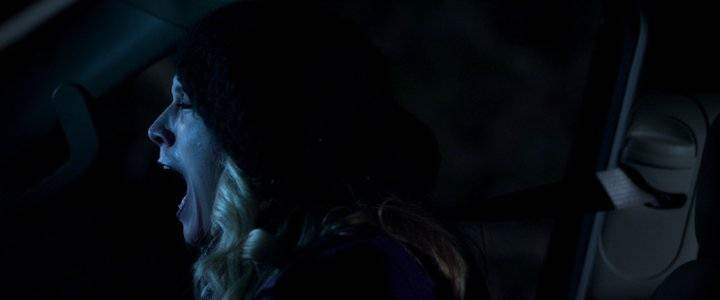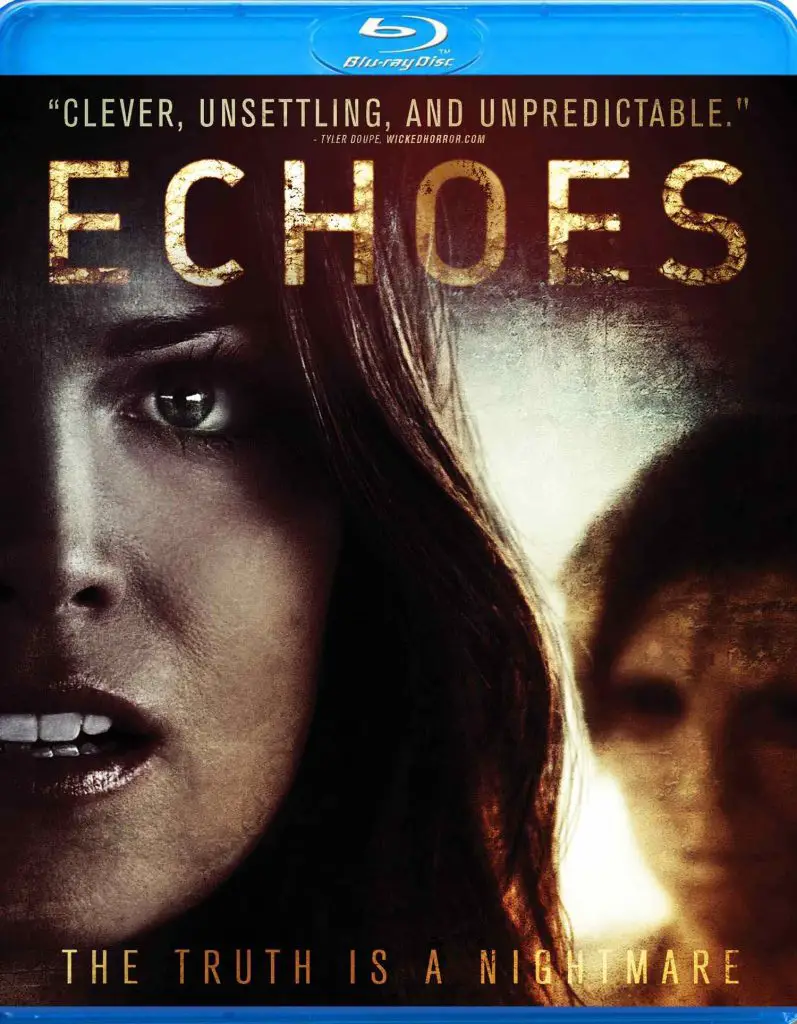Ace Marrero is a frequent Eric England collaborator and an up-and-comer on the genre film scene. He previously worked with England on Madison County and has appeared in several other horror-themed projects. In addition to playing a starring role in Roadside, Marrero also worked as a casting director and producer. In a recent interview, he spoke with us about working on both sides of the camera, trying to define which genre the film fits into, as well as well as the critical reaction to Roadside compared to Madison County.
The film follows Dan (Ace Marrero of Madison County) and Mindy (Katie Stegeman of Contracted) as they head out on a road trip that sees them trekking along a remote mountain road. When the couple is forced to pull over due to an obstruction in their path, they find themselves in mortal danger. A killer literally has them in his sites and is intent upon engaging them in a sadistic game of cat and mouse.
Wicked Horror: You both produced and starred in Roadside. It seems like there’s often a disconnect between the production team and the on camera talent in a film. Each party has different goals for the project. Has the duality of playing both roles given you a greater understanding of what each side goes through?
Ace Marrero: I think I’ve always been a little bit more…I hate to say business minded but that’s what comes to mind to drive the point home. I produce and I’ve been producing various things to some extent long before I was every offered the title of producer. As an actor who is not a household name, I have to be the one to produce my career. We’re the CEO of our own business, so you kind of have to learn to do all that. Those traits have already been instilled in me which is why I’ve been led down that path. Also, not forgetting the fact that Roadside wasn’t my first rode; I produced Madison County. I guess that was really the first time I “strapped on that producer’s cap” and was credited with that and knew that was what I was doing from the beginning. Going into Roadside, I already knew. I knew as much as I could given the circumstance. We all thought we had it down after having just wrapped–four or five months before–Madison County and having a successful shoot with that. I think what it taught me is that every film and every experience is unique for a reason. Having just gotten done with Madison County and then learning that even though we’ve just done this it still feels like it could be the first time in a lot of ways. It presents different challenges. It was done on a tighter schedule from the minute it was conceived and funded to the moment we started rolling camera. We shot Madison County entirely during the day. Roadside was entirely at night, so that was a different challenge that I had to, both as an actor and producer, prepare for and sort of learn on the fly. When you’re shooting in small towns like we’ve done for both films, there’s not much around to begin with and what is around isn’t open very long. And that definitely was the case on Roadside. That became one of the biggest challenges. I’m shooting through the night as the lead in this film and then we’re supposed to sleep during the day but things are only open till 4:00 or 5:00, maybe at the latest 7:00 PM. So we had to pick up food and go run errands and do stuff. So, it’s like I can’t be sleeping in and doing that stuff at the same time. So, that wasn’t something we were really prepared for or had the manpower to provide me the luxury of not having to worry about that stuff, you know? When you’re prepping a day, you usually go home and do that at night or the next morning but when you’re shooting at night, that stuff happens during the day when you’re supposed to be sleeping and your body knows that. I was prepared, as a producer, what to expect for the most part. But I think that just like any other film or project, it has produced different challenges that you have to learn how to problem solve in certain ways.
Wicked Horror: Madison County seemed to get more mixed to negative reviews upon its release. Whereas Roadside seems to be getting much better critical feedback. What do you think you guys may have done differently or learned from the previous project and applied here?Marrero: Yeah. I think with Madison County, it’s just different. It’s a slasher film. The minute you say it’s a slasher film there are expectations built into that. It becomes a question of if it’s really a gory slasher film or does it really go for that? And you attract a certain type of fan in that alone because not everybody loves those types of films but a lot of people do. There are already expectations that are built in with something like that. That I think kind of lends itself to opening up the vulnerability of getting more critics from that. Whereas Roadside is an entirely different film. From the beginning, what we wanted to do was simply show we could make a film that wasn’t a horror film for all intents and purposes. We knew that it would appeal to a lot of the same fans but it would attract a much larger base. And also just show we can tell sort of like a normal story without the bells and whistles of a killer in a mask. So, I think it feels bigger as far as the cinematography. It feels like a more expensive film. I also think that in Roadside, it’s not black and white but it’s as close to it as you’re gonna get. It’s one location for the most part. It’s this location with these characters. You’re either interested in the story or you’re not. With Madison County, people are like, ‘I don’t like the effects,’ or ‘There’s not enough blood,’ or ‘That pig mask is what drew me to the film.’ You’re either going to like this film going into it or you’re not. It’s like Phone Booth or Buried. You’re either interested in watching those kinds of films or you don’t. The only difference is they had obviously a couple of names in them. So, yeah. It’s funny you say that, though, because early on the few people that had seen it, it was a much more favorable response than Madison was early on. Some of them are starting to float in now and some are not as favorable. And some of them compare it to Eric’s Contracted. But it’s kind of a weird dynamic because it was done between the two but it’s being released after. Which I thin, also will create a different judgment on it than if it had been released before Contracted. It’s an interesting dynamic.
Wicked Horror: I’ve actually had troubled describing Roadside to people. And I can’t quite categorize it. It’s not really a horror movie or a psychological thriller or a drama. It fits into a lot of categories. When you guys were trying to sell the film, how did you position it?
Marrero: Yeah. You know, that’s a good question. Madison County was special to us because we wanted to make a film we liked. We didn’t want to worry about what we would have to do to appeal to the fans. We weren’t reinventing the wheel. We just wanted to make a film we liked and not have to follow the ten kills or a kill for every so many minutes. Roadside was just us doing what we liked again but with a different story. The one thing we did do was sort of say that it wasn’t a horror film because they were sort of expecting that from Eric and kind of just said this was a Hitchcockian dramatic thriller is always kind of how we phrased it. And if it needed further explanation we would compare it to like a Buried or a Phone Booth. It’s very similar in a lot of ways, you know? Cat and mouse, single location, high concept. So, that was kind of how we marketed. But, you know what? You can’t outrun the genre and I think that’s one thing I learned. And I think we all learned was that all the major players, all the interest that was coming from it was coming from a genre standpoint. Which we knew we would have in our back pocket but we thought we would try to push in a different direction. And we certainly did. We had probably about 2o or 30 poster designs and we never settled on anything outside the original teaser design because nothing was really hitting that we felt like was the face of the film. We were hoping that the company that we would go with would see that and take it on and find an edge. You can’t force it sometimes. And it’s still being marketed as more of a horror film. I’m curious to see how people respond because some of the reviews are like, ‘Oh, it’s set up like this but it doesn’t really go there.’ And I can see that. It’s a tough one. I think we knew that after the fact. It is going to find the audience it’s going to find and it’s going to be marketed the way it’s marketed.
 Wicked Horror: You and Eric have collaborated on a couple of different projects now. How did you guys first come to work together and what do you think the chances of you retiming are?
Wicked Horror: You and Eric have collaborated on a couple of different projects now. How did you guys first come to work together and what do you think the chances of you retiming are?
Marrero: I met with Eric when I shot his student thesis back in the day and then we just kind of stayed in touch. He was trying to get Madison County made and then he wrote this film with me in mind that we shot called Hostile Encounter which was a feature film, more of and experimental type thing. So, that technically was his and all of our first feature but it never went anywhere because it never finished. Madison County started and then Roadside. And then the snowball continued on. We’ve worked together since on a couple of smaller things, shorts. Eric and I were always the type to kind of joke about the Tim Burton and Johnny Depp thing–that we’d always work together. And I’d like to think that still would be the case. There was a film that he wanted me to do a part in that he was going to direct and that ended up falling through. There have been other parts that we have talked about possibly doing and some other stuff. It’s interesting where things start off and where things end up. Everything changes and factors into that. I’d like to think we’d work together again at least definitely as an actor and director but I guess time will tell and we’ll see how that all shakes out.






